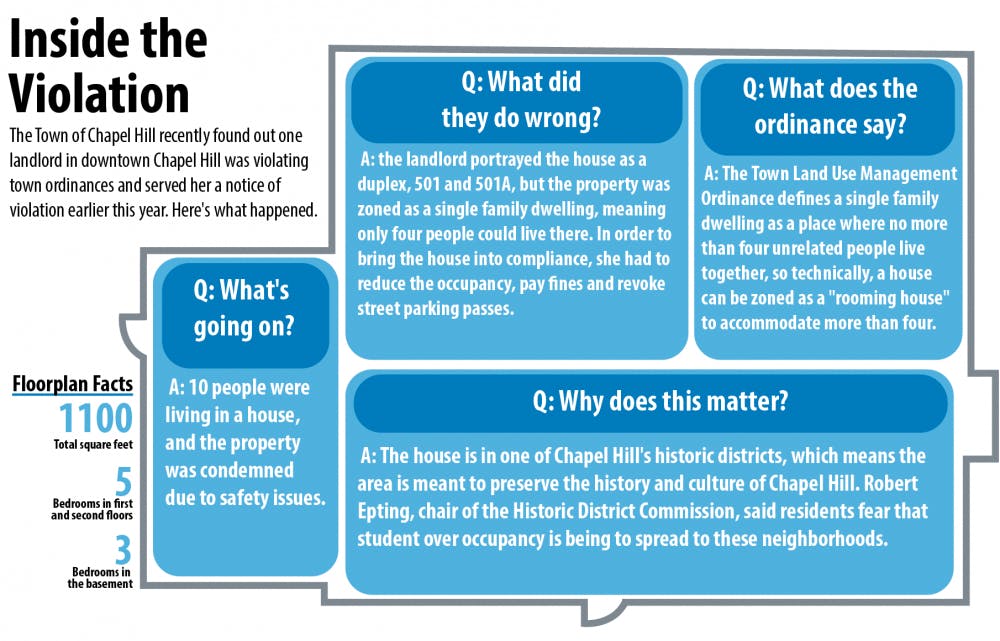On Jan. 25, Town staff visited the property and found the entire house was being used for residential purposes.
The violation notice notes a tenant said 10 people live in the property, and there were building code violations related to fire emergency access. The property could've been converted from a single-family dwelling into a rooming house, but the owner never obtained the permits, according to the notice.
It is illegal in Chapel Hill for more than four unrelated individuals to live together if the property is a single-family dwelling, according to the Town Land Use Management Ordinance.
The notice required Kairys to suspend the property’s five street parking passes, comply with occupancy requirements and hold an inspection within 30 days. She was subject to fines if she did not comply and could face jail time.
On April 10, the Town sent her a final notice.
The over-occupancy and fire code violations had not been solved. In addition to previous penalties, she could face additional fines.
She was asked to reduce the occupancy to four people, pay $3,200 and attend a town hearing.
Kairys said in a text that she has been cooperating with the Town to resolve the violation. She declined an interview.
The tenants of the property also declined to comment.
Gene Poveromo, interim zoning enforcement manager for the Town, said in an email that the owner is moving toward full compliance.
The property was condemned. It's unclear what will happen to the students on the lease for next year.
“We anticipate that this matter will be resolved in time for the upcoming school year,” Catherine Lazorko, communications manager for the Town, said in an email.
To get the day's news and headlines in your inbox each morning, sign up for our email newsletters.
This isn’t the first time this property has run into trouble.
In October 2011, shortly after Kairys Properties took over, neighbors complained that tenants were parking on other properties and that it appeared exterior construction had been done without approval.
In 2012, the Town inspected the property and said the owner achieved compliance and paid the fees.
In 2015, a Chapel Hill resident wrote an email to the Town Council as it was considering modifying the LUMO, saying corporate ownership of properties can threaten historic neighborhoods.
“Wondering about another example, I looked into the house at 501 North Street, which was sold a few years ago by its long-time occupant. Last spring, I was told by one of my UNC students that she was one of thirteen (13) students living there,” he said in the email. “So I decided to look up who owns it. Turns out it is owned by a real estate investment firm that specializes in student rentals in Chapel Hill and, through various corporate entities, owns many properties in downtown neighborhoods.”
The Daily Tar Heel reached out to Kairys Properties but did not receive a response by the time of publication.
The past and future of housing
This isn’t the first occupancy violation of the last year. Lazorko said six instances have been reported — three of those were confirmed violations, including 501 North St.
But the Town isn't considering changing the LUMO.
Karen Stegman, a Town Council member, said students make the community more vibrant, so she welcomes them to live off campus.
“So it is important that the Town and the University continue to collaborate to ensure there is an adequate supply of housing for students, both on campus and off,” she said in an email. “When we don't, student housing demand can create pressures within existing neighborhoods that result in negative impacts, such as gentrification, over time.”
Loryn Clark, executive director of housing and community for the Town, said the ordinance isn’t meant to be an anti-student regulation, but improve connections between short-term and long-term residents.
“We try to do a lot of outreach to residents, including students, about being good neighbors, you know, don’t park all over the front lawn, don’t leave trash cans out after trash day and making people understand you’re in a neighborhood,” she said.
She said the ordinance can be hard to enforce because it’s difficult to prove how many people live in a house. The state fire code regulates housing with more than five people, and she said she doesn’t know why the Town went beyond that to four.
The main enforcement actions are communicating with and fining property owners, she said, but she doesn't know if anything prevents property owners from passing fines onto tenants.
Robert Epting, chairperson of the Town Historic District Commission, said he knows the housing overlap between the University and the Town isn’t new, and he doesn’t think it’s always a problem.
He used to live in 501 North St. when he was a UNC student in the 1970s, and remained close friends with the former owners after moving out.
While he was in law school at UNC, he studied other towns that passed similar ordinances. But federal courts struck these down because they violated freedom of association, so towns made the ordinances numerical instead.
“I must say, since they’ve done that, I think that we’ve gotten along reasonably well,” he said.
But he has noticed a worrying trend.
“Northside has had a bunch of teardowns of historic structures, many of which have been in great condition and around since LBJ’s presidency, and they didn’t have to be torn down, they just couldn’t be occupied in the way these awful monstrosities that replaced them do,” he said.
He said there’s a fear in the Franklin-Rosemary district that these trends are going to spread there.
Tristan Routh, a staff attorney for UNC Student Legal Services, said it is unrealistic to expect students not to over-occupy if given the chance because the housing market in Chapel Hill would have to change.
“I don’t think there’s a good answer here that recognizes the interests of students and the policy interests of the Town in wanting to keep housing prices affordable,” he said.
He recommends that students don’t enter housing situations where they would violate town ordinances. If they have to, they should push the landlord to add all tenants’ names to the lease so they have proof the landlord knew.
Foster said he hopes this situation makes landlords in the town realize they should take tenant welfare more seriously.
“The landlords make plenty of profit, they just need to put more money into the property,” he said. “(Amy Kairys) didn’t want to do it because she wanted to keep up appearances, and if she had re-invested the money, she wouldn’t have had a problem here.”
@ampogarcic
city@dailytarheel.com
Anna PogarcicAnna Pogarcic is the editor-in-chief of The Daily Tar Heel. She is a senior at UNC-Chapel Hill studying journalism and history major.





